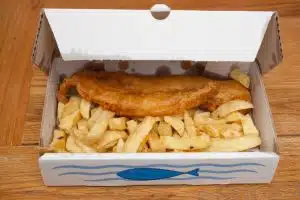
Taking this route provides many benefits including relieving owners of further financial responsibility and avoiding to the greatest extent the potential damage caused by weak performance or major losses.
In some cases, it may even be possible to secure financial compensation from creditors in exchange for restructuring. Company liquidation is just one option available amongst many complex decisions that must be made regarding the future of your business and should always be taken with professional advice
Professional liquidation advice for take-away owners
If your company is severely struggling, it is imperative that you seek out licenced insolvency support. Put creditors first. Directors who continue operating after their company declares bankruptcy risk hefty penalties.
However, it can be challenging to determine when a company has entered insolvency, which is why receiving prompt professional counsel is crucial. If you seek help early on in your financial difficulty, you’ll also be able to learn about your greatest options, which may be quite varied.
Why is your take-away restaurant facing liquidation?
Businesses that were once lucrative have lost a significant amount of money due to the coronavirus, but customer-facing industries like restaurants and takeaways have encountered unprecedented trading and financial difficulties.
Even while take-away restaurants had a wider opportunity to trade than seated enterprises, the national and municipal lockdowns necessary to stop the spread of the coronavirus, often enforced at short notice, created an impossible operating environment for them.
Applying social distance guidelines and maintaining a Covid-secure restaurant come at a hefty expense, especially when the firm is struggling to make a profit. What can you anticipate if your take-out restaurant does need to be liquidated?
Creditors’ Voluntary Liquidation for take-away restaurants
You can fulfil your legal obligations as a company director by participating in a creditors’ voluntary liquidation, or CVL, but you may also be eligible to receive director redundancy pay. The CVL is a formal process that closes the business down in a timely way while safeguarding the interests of your creditors.
A licenced insolvency practitioner (IP), whose primary responsibility is to guarantee creditors receive the most return from the company’s liquidation, must oversee the procedure. Selling totally owned firm assets is how this is accomplished.
Unfortunately, this results in unsecured creditors, such suppliers, rarely receiving a dividend from the liquidation process because the remaining obligations are wiped off. As a director, CVL does provide you some power, even though it’s obviously not the best conclusion for your company.
You get to pick the liquidator for your business as well as the day that it goes into liquidation. The chance to get redundancy pay as a director is an additional perk.
Redundancy pay for take-away restaurant owners
Uncommonly, company directors who operate under an employment contract may be eligible to apply for statutory redundancy in the same manner as their employees.
You must have worked for the business for a minimum of 16 hours per week in a practical capacity and your company must have been incorporated for at least two years.
You can be qualified to file a claim if your company also owes you money, possibly your initial investment. If you’re successful, you might fund your company’s CVL with the redundancy money.
Why is Creditors’ Voluntary Liquidation better than compulsory liquidation?
You must be extremely careful to follow the right course of action after your business enters insolvency due to the strict insolvency regulations in the UK. You risk disqualification or perhaps personal culpability if you wait for a creditor to enforce liquidation rather than taking the initiative and defending creditor interests.
If you decide that your take-out restaurant needs to be liquidated, this is a crucial factor to take into account and should direct your future actions. However, it’s also crucial to keep in mind that liquidation may not be your only choice.
What other options might there be then?
Rescuing your take-away restaurant business
HMRC Time to Pay
HMRC Time to Pay is an easy and discreet way for businesses to deal with their tax liabilities. It helps to reduce the worry of large debts, by making it possible to pay overdue taxes over a fixed period in instalments. This process is especially helpful during times of financial difficulty as it provides an affordable way of dealing with debt while taking enormous stress out of the equation. HMRC Time to Pay can be a lifeline to businesses that are struggling but it’s important to remember that this must be followed up by realistic budgeting and timely payment plans moving forward.
Company Voluntary Arrangement (CVA)
Company Voluntary Arrangements (CVA) are an increasingly popular way for organizations to renegotiate terms with their creditors in order to improve a company’s financial situation. Suddenly facing financial distress can cause huge amounts of stress and uncertainty but with the right advice and guidance there is the potential to turn things around. A CVA provides a formal structure to work out an arrangement with creditors, allowing the company to manage its debts over time and ultimately bring it back into financial health. It’s becoming more common for companies to take this route due to its ability to give confidence back where it has been lost, put creditors at ease and open up the possibility of restructuring or business growth.
Need more information
if you take away business needs to enter insolvency, our expert team are here to help you place the business into liquidation. To get started simply complete the online enquiry form or contact us on the above number.
With over three decades of experience in the business and turnaround sector, Steve Jones is one of the founders of Business Insolvency Helpline. With specialist knowledge of Insolvency, Liquidations, Administration, Pre-packs, CVA, MVL, Restructuring Advice and Company investment.
